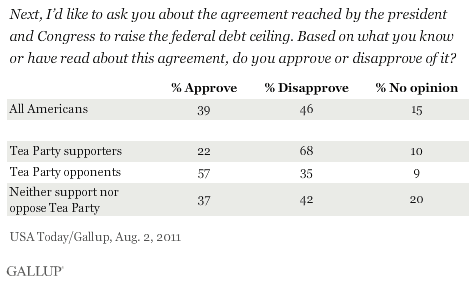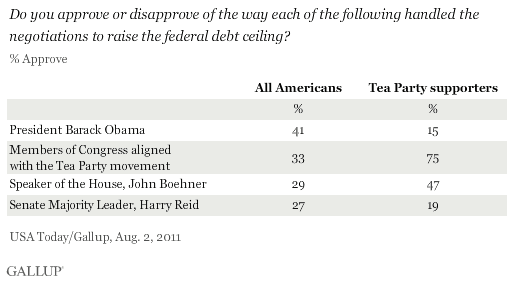PRINCETON, NJ -- Tea Party supporters overwhelmingly disapprove of the agreement reached by President Obama and Congress to raise the federal debt ceiling, by a 68% to 22% margin. A majority of Tea Party opponents approve of the agreement, while those who are neither supporters nor opponents of the Tea Party have mixed views.

Overall, Americans are more likely to disapprove than approve of the debt ceiling agreement, by a 46% to 39% margin, with Republicans (64%) and independents (50%) most likely to disapprove, while a majority of Democrats (58%) favor it. Since about half of Tea Party supporters are Republicans, with most of the rest independents, it is not surprising to find that Tea Party supporters are negative about the debt ceiling agreement. The reasons for this disfavor with the agreement probably focused on the fact that the debt ceiling was raised without an immediate and offsetting reduction in federal spending.
During the negotiations, Speaker Boehner was in the difficult position of attempting to represent the views of the Tea Party-supported members of the Republican caucus in the House while also representing the views of more moderate Republicans. On balance, Tea Party supporters came away from the negotiations with a more positive than negative impression of how Boehner handled the situation, by 47% to 39%. However, three-quarters of Tea Party supporters approved of how Tea Party-aligned members of Congress handled the negotiations, underscoring how Tea Partiers around the country felt more solidarity with members of Congress they elected and sent to Washington last year than they did with the Republican speaker.

Not unexpectedly, few Tea Party supporters approved of the way either President Obama or Senate Majority Leader Reid handled the negotiations.
Americans' overall approval ratings for the major players involved in the negotiations showed little change over the last week of the negotiations. Among those who had an opinion about Obama or Boehner, approval in the most recent survey, conducted Aug. 2, was virtually identical to that in Gallup's July 27 survey. Approval of the way Reid handled the negotiations increased slightly between the two surveys. Overall, opinions remained more negative than positive for all three, in line with the generally muted response Americans have to the new agreement.
Implications
Pressure from newly elected, Tea Party-supported members of Congress was a significant factor that led to the tense and high-profile negotiations over raising the debt ceiling. The agreement that was reached included substantial cuts in federal spending, no tax increases, and the promise of even more substantial cuts this fall -- all issues pressed by those affiliated with the Tea Party. Yet rank-and-file Tea Party supporters across the country clearly ended up disliking the agreement, with disapproval outweighing approval by more than a 3-to-1 ratio. Tea Party supporters were also only mildly approving of the job Speaker Boehner did in helping broker the deal with the Senate and the White House.
This disapprobation on the part of Tea Partiers presumably reflects the view that the spending cuts included in the agreement were not large enough and that the debt ceiling should not have been raised at all. Further, the agreement did not include a balanced budget amendment, although passage of such an amendment by the terms of the agreement would immediately authorize a second increase in the debt ceiling in the months ahead.
Tea Party supporters' negative reactions to the debt agreement may not bode well for the chances that the soon-to-be-formed supercommittee of 12 House and Senate members will reach a compromise agreement on further spending cuts this fall. If the six Republican members of the committee reflect the sentiments of Tea Party supporters, they may hold out for the exact provisions supporters want, even if that means no agreement is reached, thus triggering automatic spending reductions.
Survey Methods
Results for this USA Today/Gallup poll are based on telephone interviews conducted Aug. 2, 2011, on the Gallup Daily tracking survey, with a random sample of 1,012 adults, aged 18 and older, living in all 50 U.S. states and the District of Columbia.
For results based on the total sample of national adults, one can say with 95% confidence that the maximum margin of sampling error is ±4 percentage points.
Interviews are conducted with respondents on landline telephones and cellular phones, with interviews conducted in Spanish for respondents who are primarily Spanish-speaking. Each sample includes a minimum quota of 400 cell phone respondents and 600 landline respondents per 1,000 national adults, with additional minimum quotas among landline respondents for gender within region. Landline telephone numbers are chosen at random among listed telephone numbers. Cell phone numbers are selected using random-digit-dial methods. Landline respondents are chosen at random within each household on the basis of which member had the most recent birthday.
Samples are weighted by gender, age, race, Hispanic ethnicity, education, region, adults in the household, and phone status (cell phone only/landline only/both, cell phone mostly, and having an unlisted landline number). Demographic weighting targets are based on the March 2010 Current Population Survey figures for the aged 18 and older non-institutionalized population living in U.S. telephone households. All reported margins of sampling error include the computed design effects for weighting and sample design.
In addition to sampling error, question wording and practical difficulties in conducting surveys can introduce error or bias into the findings of public opinion polls.
Polls conducted entirely in one day, such as this one, are subject to additional error or bias not found in polls conducted over several days.
View methodology, full question results, and trend data.
For more details on Gallup's polling methodology, visit www.gallup.com.
